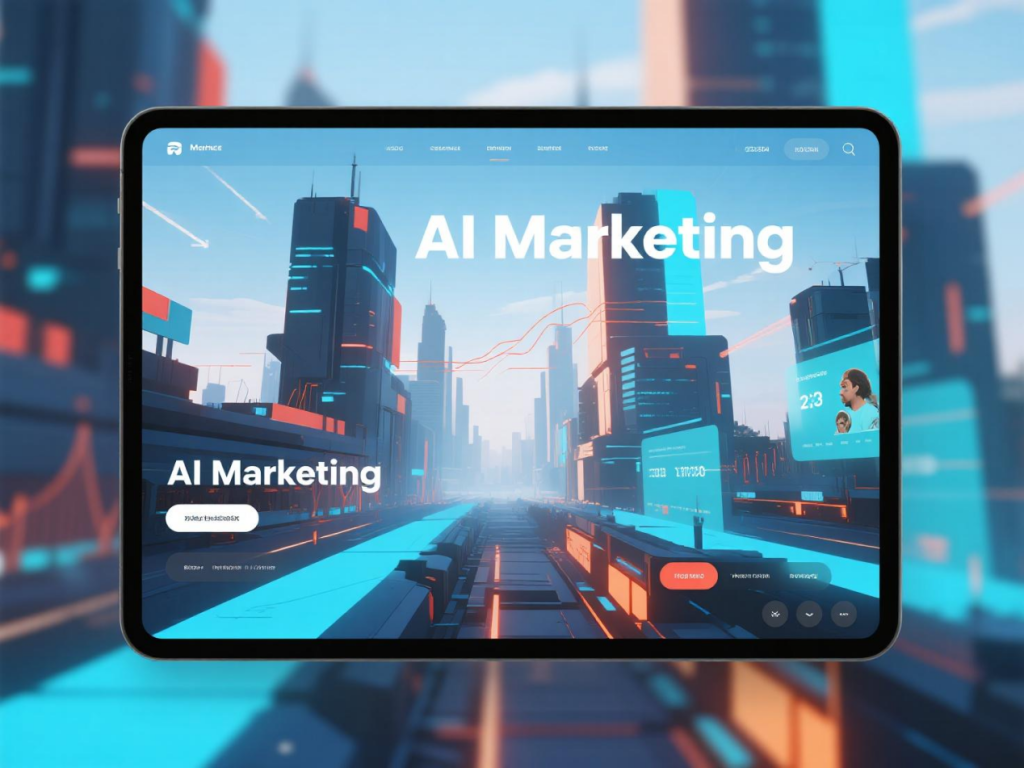AI has evolved from a futuristic concept in marketing into a core technology driving personalized services, customer experience and predictive analytics. Forward-thinking brands are leveraging AI marketing solutions to deliver genuine personalization at an unprecedented scale. These tools are reshaping content creation, freeing marketers to focus on high-level strategy while reducing resource consumption. This article will break down the definition, value, and implementation strategies of AI marketing.
1 What is AI Marketing?
AI Marketing refers to the application of AI technology to automate and intelligently enhance marketing activities. It encompasses areas such as customer insights, content production, customer engagement, and performance optimization. At its core, AI Marketing leverages technologies like machine learning, natural language processing, and big data analytics to shift the marketing paradigm from a “person-to-product” model (where people find products) to a “product-to-person” model (where products find the right people). This transformation significantly enhances marketing precision and efficiency.

Generated by Dreamina
2 The Role of AI in Marketing
For marketers who value creativity and strategic thinking, AI is becoming an essential tool. By handling time-consuming tasks, AI frees up marketers to refocus on higher-level strategies, creative innovation, and boosting team productivity.
01 Content Creation
AI is transforming how marketing content is generated. From crafting engaging website copy and social media posts to producing high-quality static images and even compelling videos, these capabilities free up valuable time and resources for marketers. This new flexibility empowers them to experiment with diverse content formats, tailor messages to specific audiences, and ultimately deliver more impactful marketing experiences.
02 Personalized Recommendations
AI-driven recommendation engines analyze vast, multi-dimensional user datasets in real time—including historical browsing paths, purchase records, search keywords, page dwell time, social interactions, and device information—to deeply learn and understand each consumer’s unique preferences, behavioral patterns, and latent interests. This enables instant delivery of personalized content and product recommendations, effectively boosting customer loyalty, user retention, and engagement.
03 Customer Service
Early AI customer support tools (such as rule-based chatbots) could only handle standardized queries (e.g., order status) with rigid interaction patterns reliant on predefined scripts. Today, generative AI assistants leverage natural language processing and deep learning to deliver end-to-end journey coverage and dynamic ticket management.
End-to-End Journey Coverage:
- Pre-sales consultation: Interpreting ambiguous requests and recommending product combinations;
- In-sales support: Resolving complex issues in real-time and auto-triggering workflows;
- Post-sales maintenance: Diagnosing product failures and providing step-by-step troubleshooting guides.
Dynamic Ticket Management:
- Automatic prioritization of urgent tickets (e.g., keywords: “critical failure,” “complaint”);
- Predictive maintenance through historical ticket analysis and proactive solution delivery.
04 Predictive Analytics
AI analyzes historical data to forecast future trends, empowering marketers to make data-driven decisions and optimize workflows. By identifying patterns in customer behavior, it predicts product performance, optimizes pricing strategies, and enhances lead scoring accuracy. Businesses leverage these insights to refine marketing strategies, reduce customer attrition, and explore new markets aligned with consumer demand.
05 Search Engine Optimization
AI-powered tools excel at keyword research, analyzing search intent, and suggesting content topics aligned with current trends and user behavior. They also evaluate backlink profiles and identify high-quality link-building opportunities to enhance domain authority and search rankings. By providing insights into voice search optimization and user experience metrics, AI empowers marketers to holistically optimize websites, achieving sustainable organic growth.
3 Developing an Effective AI Marketing Strategy
01 Auditing Existing Marketing Efforts
Before integrating AI into your marketing strategy, conduct a thorough audit of your current processes. Identify efficiency bottlenecks and areas primed for optimization.
02 Defining AI Marketing Objectives
Clearly outline the goals and tasks you intend AI to accomplish before selecting tools or initiating platform testing. This aligns your AI strategy with core business objectives and enables effective prioritization.
03 Selecting Suitable AI Tools
Choosing the right AI tools is critical for developing an effective marketing strategy. Key AI solutions worth exploring include: AI content generation tools that produce copy, images, and more; Predictive analytics tools that forecast customer behavior and optimize campaigns; Personalization engines delivering real-time recommendations based on user data; Marketing automation platforms automating cross-channel customer journeys.
04 Testing and Analyzing AI Data
One of the pitfalls of AI in marketing is its susceptibility to inaccurate data. Regularly collect, test, and analyze AI-generated data to detect and eliminate these inaccuracies on an ongoing basis.
05 Tracking and Optimizing Your AI Marketing Strategy
Once AI is embedded within your marketing strategy, continuously monitor its impact and refine execution as needed. Define KPIs to measure success, such as: conversion rate lift, engagement and retention metrics, reduction in manual workload and operational costs, ROI of AI-driven marketing campaigns, customer satisfaction scores and feedback on AI interactions.
AI marketing represents not merely a technological revolution, but a profound transformation in marketing philosophy and business models. Only by deeply understanding its essence and systematically building integrated capabilities across data, technology, processes, and teams can AI marketing truly transition from concept to implementation, unlocking AI’s full commercial potential. In the future, AI-driven marketing will become the decisive competitive edge for businesses vying for market leadership.
Source of featured image: Photo by Zulfugar Karimov on Unsplash
